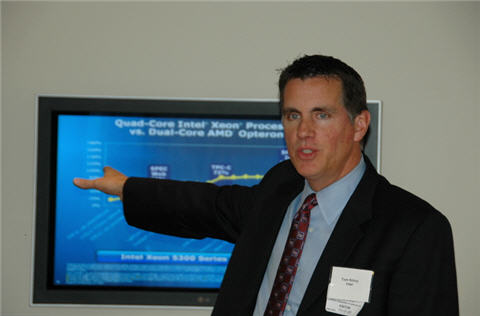Intel rides the datacenter build out wave

Intel is more than making up for slower sales of enterprise servers due to consolidation and virtualization by selling processors, such as the Xeon 5100 (Woodcrest) and 5300 (Clovertown) series, for large-scale datacenters built by leading Internet portals. "In the last three months we have shipped more product into this segment than in the prior year," said Tom Kilroy, vice president and general manager of Intel's Digital Enterprise Group. "It is driving a lot of growth, relieving some of pressure as enterprise consolidate. The Internet more than makes up for it."
Kilroy said that two or three players Internet portal companies represent three to five percent of the total addressable market for server systems." He mentioned the big three--Microsoft, Google and Yahoo--and also Baidu, China's dominant search portal, as the players.

Tom Kilroy, vice president and general manager of Intel's Digital Enterprise Group discussed the demand for processors to fuel the big Internet service provider datacenters and touts Intel's recent benchmark wins over AMD
"It's a classic case, where performance and energy efficiency are important," Kilroy explained. According to Boyd Davis, general manager for Intel's Server Platforms Group Marketing, the mega-datacenters require complete optimization, such as specific power consumption for processors or configuration of the motherboards. "They don't want to pay for anything they don't want," Davis said. Intel is working with OEMs to optimize its parts for the mega-datacenter owners, although Google is a bit of a special case. Davis described Google as "a unique self-integrator."
Certainly, AMD is looking to catch the datacenter build out wave as well. During the press event, Kilroy touted benchmark wins with the Xeon 5100 and 5300 series and momentum with Wall Street customers. "We were getting hammered badly [by AMD] on Wall Street accounts. Now 9 out of 10 customers are moving to Xeon," Kilroy said.
Update: At a press conference held at the same time as Intel's a few blocks away, Intel marketing chief Henri Richard took issue with Intel's benchmark plans. My colleague David Berlind was there:
Richard was barely a sentence or two into the opening of the press conference when he said, "I am sick and tired of being pushed around by a competitor that doesn't respect the rules of fair and open competition."
The benchmark controversy won't be easily resolved. For decades, vendors have been accused of gaming benchmarks and the benchmarks themselves have been criticized for lacking real world relevance. What is clear, however, is over the last year that Intel has risen to AMD's challenge.